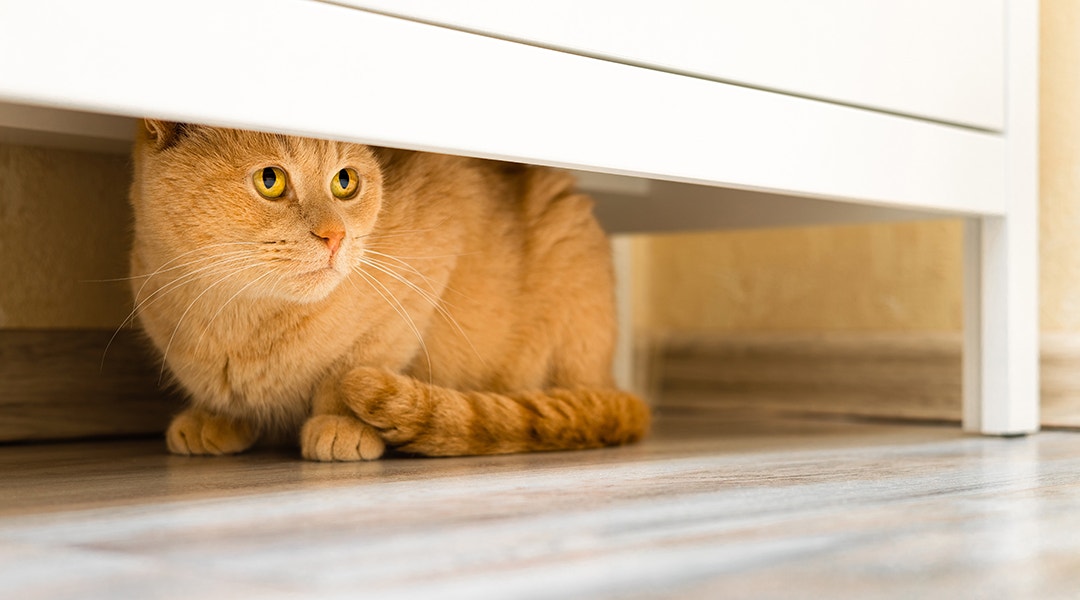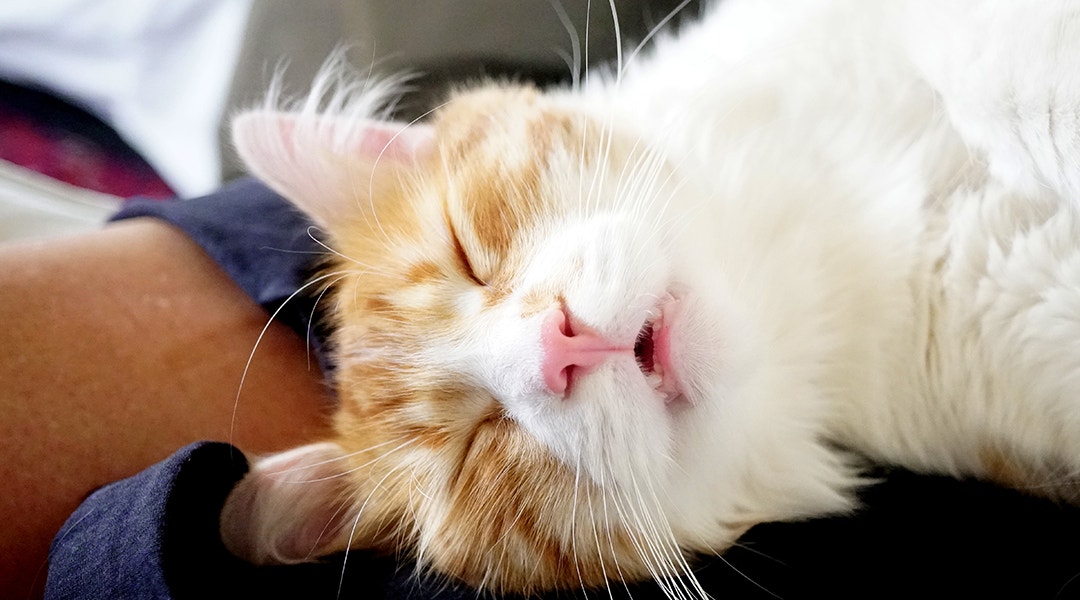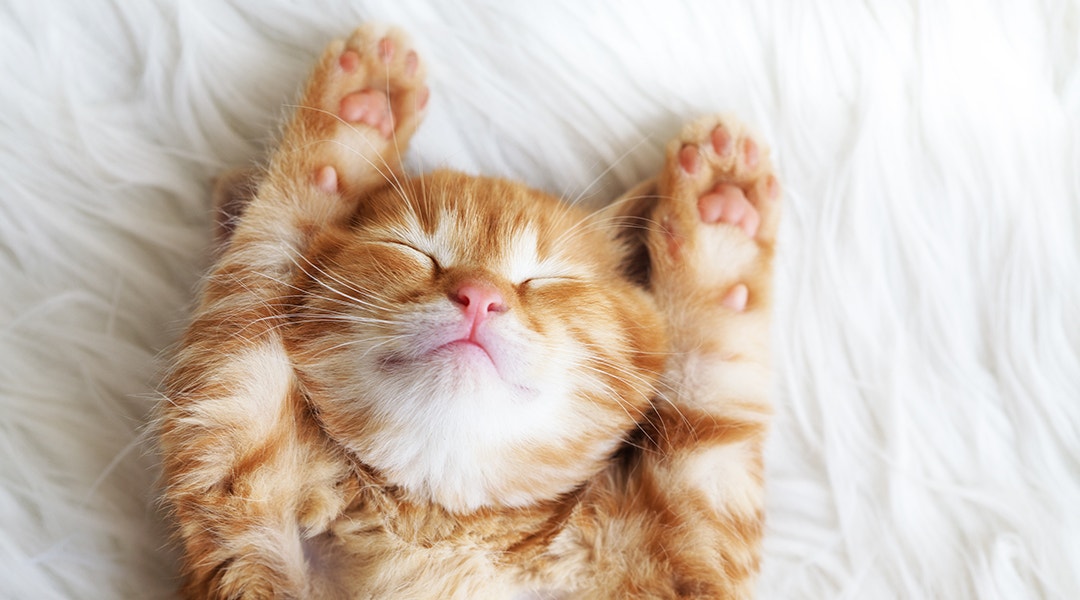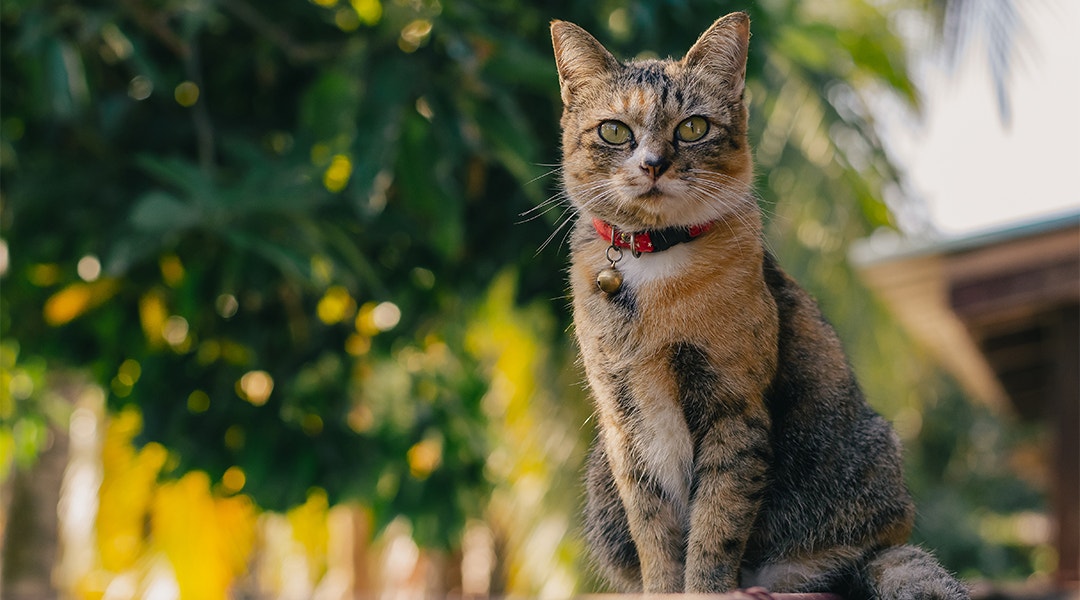Many cat owners worry about why their cat is hiding, especially if the cat is hiding in a new spot regularly. It is important to remember that hiding is a common instinct for cats, however, understanding the reasons behind this behaviour is key to ensuring their overall well-being. For example, you may find your cat hiding under the bed, this behaviour can be a form of communication, signalling everything from fear, stress, illness or even a simple need for privacy.
Common reasons your cat is hiding
Why is my cat hiding suddenly? In this article, we will cover all the key reasons behind your cat hiding, so that you can provide them with the best possible care and identify when this behaviour is something to be concerned about.
Fear and anxiety
If your cat is feeling particularly overwhelmed by fear or anxiety, their first instinct may be to hide. For example, if your new cat is hiding, this is normal and will ease as they become more familiar with their new family and surroundings. Other reasons for fear and anxiety include: changes to their environment, new pets or people in the home, loud noises, changes to their everyday routine and traumatic past experiences. Figuring out the root cause is key so you can help them feel safe again and limit this behaviour.
Illness or pain
Why is my cat hiding suddenly? Cats are also known to hide when they are feeling ill or are in pain. Make sure to observe their overall body language and check for behavioural changes, such as changes to their appetite, changes to overall social interaction, haunched posture, urgent or repeated vocalisations and changes to grooming or litter box habits. Pained looking movements, inability to jump, a tucked tail or a lowered head can also indicate something is not right with their overall health. Make sure to take your cat to the vet for a checkup if you notice the above accompanied by hiding.
Resting
If your cat is hiding under the bed often they may simply be resting in a quiet, cosy spot. If your cat is acting normally and hiding during the day for a nap, there is probably nothing to worry about. Some cats prefer more moments of solitude, especially in busy households.
Playing
Why is my cat hiding but acting normally and playing? Cats also enjoy stalking their prey and pouncing unannounced! If you find your cat hiding behind the sofa, they may be gearing up to pounce on your feet or a toy. All will be revealed if you observe their behaviours.
Need for Privacy
Why is my cat hiding from me or other pets? Some cats have a greater need for privacy than others; they may be feeling overwhelmed and just want some quiet downtime. Or they may have had enough socialising for the day. Cats like to retreat to an elevated space or preferred hiding spot for some peace and quiet. If your cat is acting normally and hiding often, they may just prefer a quiet life.
How to tell if hiding is a problem?
If you are worried about your cat hiding suddenly, look for these red flags that something else may be wrong. Generally cats hiding is harmless, unless paired with the behaviours below. Exploring cat recall training may also help.
- Hiding away for extended periods of time.
- Avoiding food or water.
- Generally showing signs of illness, such as repeated bouts of vomiting or diarrhoea.
- Haunched or pained posture.
- Changes to grooming.
- Changes to litter box habits.
- Changes to sociability.
- Urgent or repeated vocalisations.
- Visible signs of injury.
How can you help your hiding cat?
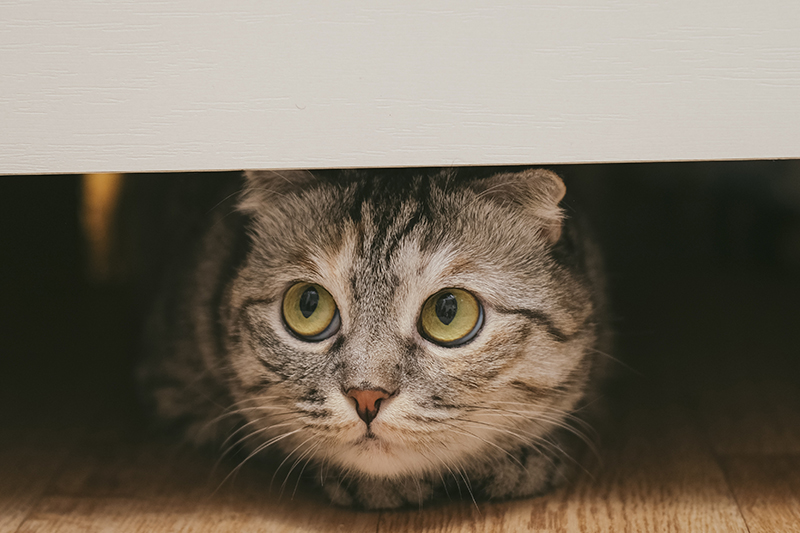
It's important to note that you should never force a cat out of its hiding space, even if their hiding behaviours are normal. This will only increase their anxiety in the long run and may cause more trust issues, especially if a new cat is hiding. Follow these steps to help your cat gain more confidence in your home.
- You can offer treats like our delicious Dreamies to lure them out and gain trust!
- Aim to make the home feel as safe and comfortable as possible.
- Reduce overall stress, such as loud noises and unfamiliar visitors.
- Provide elevated spaces and hiding spots. If you see them kneading in a particular area you know this spot makes them feel extra safe.
- Make sure to prioritise dedicated playtime.
How to provide a hiding place for your cat
Have you ever noticed that cats like to climb? It is natural for cats to want to hide and feel secure sometimes, especially when we are hoovering! Providing spots for them to do this around your home is a great idea. Giving them access to cosy boxes, cat trees, and vantage points can also discourage your cat hiding under your bed with the lost socks! Treats and positive reinforcement is also a great idea if you’re having trouble luring them from an awkward hiding spot or introducing them to a new one.
Conclusion - Why is my cat hiding?
It's important to avoid feeling rejected by your cat’s hiding habits, as it is usually a normal, instinctual behaviour, especially if a new cat is hiding. Always remember that patience and understanding are key. The better we understand our pet’s natural behaviours, the easier it is for us to bond with them.
Top tips for managing cat hiding.
- Observe them and note any changes to their overall behaviour or routine; this can help you rule out illness or injury.
- Provide a comfortable and safe environment that gives them access to lots of elevated spaces, such as cat trees. Hiding spots such as boxes and cat beds are also a great idea.
- Work to build up trust by rewarding positive interactions with treats and prioritising playtime.
FAQ - Cat hiding
What is the 3-3-3 rule for cats?
The 333 rule acknowledges a cat's adjustment period after adoption. The 333 rule indicates that it usually takes around 3 days for a cat to get used to their new surroundings after adoption. During this time, they may show signs of anxiety, stress and fear. After 3 weeks, your cat will start to feel more at home around you and their environment. You will notice they generally start to interact more. At the 3-month mark, they should become fully adjusted and integrated, feeling truly at home and safe and bonding with their new family for life.
Why is my cat hiding but still eating and drinking water?
If your cat is acting normally while engaging in hiding behaviours, it is safe to say they are just indulging in their natural instincts. They may be resting, overstimulated from loud noises or other pets, or even playing. Try not to feel rejected and engage in bonding activities like playtime when they come out.
Do cats hide when they are in pain?
Yes, cats are known to hide when they are suffering from an illness, injury or when they are in pain. This is why observing their overall routine and behaviours for any abrupt changes is important. If you also notice signs of illness (vomiting or diarrhoea), injury (limping or wounds) or concerning changes to their behaviour, such as eating or drinking less, it is best to take them to the vet for a checkup, as they may be trying to let you know they are not feeling their best.
Why is my cat hiding all of a sudden?
It is important to remember that hiding is a normal instinct for cats, however, understanding the reasons behind this behaviour is key to ensuring their overall well-being. If your cat is hiding all of a sudden and also showing signs of illness, injury or overall changes to their normal routine, it is a good idea to take them to the vet for a checkup. If they are not showing any concerning signs and are hiding all of a sudden, they may just be overstimulated or resting. Try to ensure a calm environment to minimise their need to hide.

